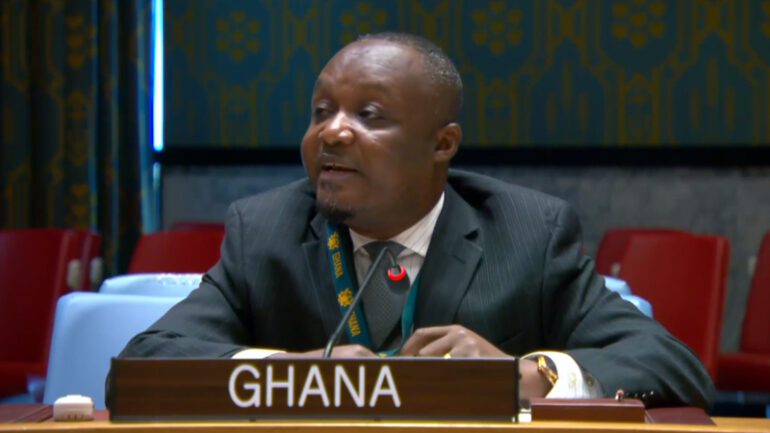Report by President of International Residual Mechanism for Criminal Tribunals (IRMCT)

Mr. Solomon Korbieh
Minister
Permanent Mission of Ghana
Security Council Chamber
United Nations HQ, New York
December 12, 2023
REPORT BY THE PRESIDENT OF THE INTERNATIONAL RESIDUAL MECHANISM FOR CRIMINAL TRIBUNALS (IRMCT)
Mr. President
I wish to thank the President of the International Residual Mechanism for Criminal Tribunals (the Mechanism), Judge Graciela Gatti Santana, and the Prosecutor of the Mechanism, Mr. Serge Brammertz, for submitting their assessment reports to the Council pursuant to paragraph 16 of Security Council resolution 1966 (2010) which provides Council members with an overview of the progress of work as well as the challenges facing the Mechanism over the reporting period.
Mr. President
My delegation acknowledges the important role of the Mechanism in ending impunity and bringing the remaining perpetrators of atrocity crimes to justice and will continue to support all efforts to work constructively with other delegations in this regard.
Mr. President
Concerning the contents of the report, Ghana would like to make the following four points:
First, on the issue of cooperation between States and the Mechanism, we wish to express concern about the challenges the Mechanism continues to face in the area of enforcement. As rightly indicated in the report, the return of some convicted persons to the United Nations Detention Unit by States puts a financial burden on the Mechanism as the Unit was not intended for such purposes. In that connection, we continue to thank Austria, Belgium, Estonia, Finland, France, Germany, Italy, Norway, Poland, Sweden, and the United Kingdom of Great Britain and Northern Ireland for assuming additional responsibilities by agreeing to enforce the sentences of one or more convicted persons and to encourage those considering enforcing sentences in the future to do so.
ii. Another issue of critical importance on cooperation is the relocation of acquitted and released persons by the Mechanism to third States. Ghana wishes to encourage the Mechanism to continue with its diplomatic efforts in finding an amicable solution with the receiving State(s). We commend the President for complementing the diplomatic efforts of the Registrar by raising the issue during bilateral meetings with States.
iii. The arrest of Mr. Fulgence Kayishema, one of the remaining fugitives indicted by the International Tribunal for Rwanda on 24 May 2023 in South Africa shows that when States cooperate with the Mechanism this will lead to progress and the early closure of the cases before the Mechanism in line with resolution 1966 (2010). Non-cooperation by some States leads to delays and further adds to the financial burden of the Mechanism. We, therefore, call on all States harbouring fugitives to cooperate with the Mechanism by honouring their responsibilities under Chapter VII of the Charter of the United Nations.
Second, Ghana continues to pledge her support to all efforts by the comity of nations, that have a collective Responsibility to Remember and not forget that the survivors and families of victims of atrocity crimes are still crying for justice and accountability. We underscore the fact that sometimes the wheels of justice may grind slowly, but this Council needs to speak with one voice and acknowledge that if we failed in our Responsibility to Protect the victims during the genocide, we have a collective Responsibiliy to seek justice for the victims by holding accountable the perpetrators of the heinous crimes of atrocity no matter how long it takes. These survivors and the families of victims are looking up to us and we cannot let them down.
Thirdly, on the issue of complementarity, we continue to note with appreciation the continuous collaboration between the Office of the Prosecutor and the national prosecutions by providing them with access to evidence and one such collaboration has led to the impending transfer of Mr. Kayishema to Rwanda for trial if the legal procedures are exhausted in South Africa, also subject to the conditions set out in the relevant referral decisions. We urge the Mechanism to continue with such activities as this development helps in building the capacities of the Officers in the national prosecutions of the affected countries in line with the principle of complementarity.
Finally, Ghana takes note of the measures put in place by the Mechanism in Witness Protection by conducting threat assessments and coordinated responses to security-related needs under judicial protection orders and more significantly in cooperation with national authorities. We believe such measures will encourage other witnesses not to recant when called upon to give testimonies.
In conclusion, Mr. President,
I would be remiss if I concluded my last statement to the Council on this subject matter without applauding the untiring efforts of the President and Prosecutor of the Mechanism and their staff in carrying out their mandate by bringing the perpetrators of atrocity crimes to justice. I would also like to thank Ambassador Michel Biang of Gabon and his delegation for the able manner they chaired the Informal Working Group on the Mechanism.
I thank you.
